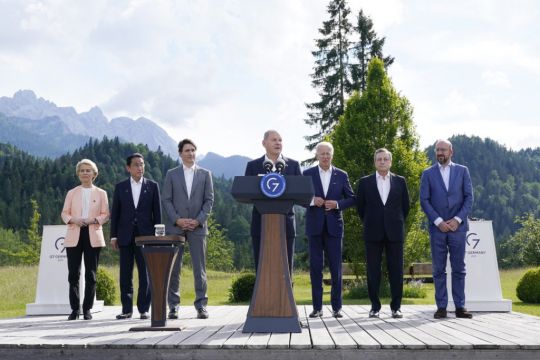Leading economic powers have conferred by videolink with Ukrainian President Volodymyr Zelensky as they underscored their commitment to Ukraine for the long haul with plans to pursue a price cap on Russian oil, raise tariffs on Russian goods and impose other new sanctions.
The US is also preparing to announce the purchase of an advanced surface-to-air missile system for Kyiv to help Ukraine fight back against Vladimir Putin’s aggression.
The new efforts come as Mr Zelensky has openly worried that the West has become fatigued by the cost of a war that is contributing to soaring energy costs and price hikes on essential goods around the globe.
He told the leaders now is not a time for negotiation with Moscow because he needs to be in a stronger position, according to a senior French diplomat.
The Ukrainian leader said “he will negotiate when he will be in a position to do so”, said the diplomat.
“His goal is to end the war as quickly as possible and to get out of it in the best possible position, so that he can negotiate from a position of strength,” the diplomat said, adding that Mr Zelensky told the summit leaders he needs economic, financial and military support.
After hearing from the Ukrainian president, the leaders pledged in a statement to support Ukraine “for as long as it takes”.
They underlined their “unwavering commitment to support the government and people of Ukraine” in the battle for their country’s sovereignty and territorial integrity, and said it is up to Ukraine to decide on a future peace settlement.

Leaders are finalising the deal to seek a price cap during the three-day G7 summit in the German Alps.
The details of how a price cap would work, as well as its impact on the Russian economy, are to be resolved by G7 finance ministers in the coming months, according to a senior official.
The largest democratic economies will also commit to raising tariffs on Russian imports to their countries, with the US announcing new tariffs on 570 categories of goods, as well as use of sanctions to target Moscow’s defence supply chains.
Mr Biden is expected to announce the US is purchasing NASAMS, a Norwegian-developed anti-aircraft system, to provide medium to long-range defence, according to the source. NASAMS is the same system used by the US to protect the sensitive air space around the White House and US Capitol.
Additional aid includes more ammunition for Ukrainian artillery, as well as counter-battery radars, to support its efforts against the Russian assault in the Donbas, the source said.

Mr Biden is also announcing a 7.5 billion dollar (£6.1 billion) commitment to help Ukraine’s government meet its expenses, as part of a drawdown of the 40 billion dollar (£32 billion) military and economic aid package he signed last month.
The war in Ukraine was already at the forefront of the G7 leaders’ minds as they opened their summit at the secluded Schloss Elmau luxury hotel on Sunday — just as Russian missiles hit the Ukrainian capital of Kyiv for the first time in weeks.
German Chancellor Olaf Scholz, the summit’s host, said the G7 countries – the US, Germany, France, the UK, Italy, Canada and Japan – are “very much aligned” on Ukraine and see the need to be both tough and cautious.
Mr Scholz said after meeting Canadian Prime Minister Justin Trudeau on Monday: “We are taking tough decisions… we will help… Ukraine as much as possible but that we also avoid that there will be a big conflict between Russia and Nato.”
He added that “this is what is of essence – to be tough and thinking about the necessities of the time we are living in”.

Mr Biden said on Sunday that Russian President Vladimir Putin “has been counting on, from the beginning, that somehow Nato and the G7 would splinter, but we haven’t and we’re not going to”.
Mr Scholz said last week that he wanted to discuss the outlines of a “Marshall plan for Ukraine” with his G7 counterparts, referring to the US-sponsored plan that helped revive European economies after the Second World War.
He said: “Rebuilding Ukraine will be a task for generations.”
The G7 is already committed to help finance Ukraine’s immediate needs. Finance ministers from the group last month agreed to provide 19.8 billion dollars (£16.1 billion) in economic aid to help Kyiv keep basic services functioning and prevent tight finances from hindering its defence against Russia.
The G7 meeting is sandwiched between a European Union summit last week that agreed to give Ukraine the status of a candidate for membership — kicking off a process that is likely to take years with no guarantee of success — and a summit of Nato leaders starting on Tuesday in Madrid.







